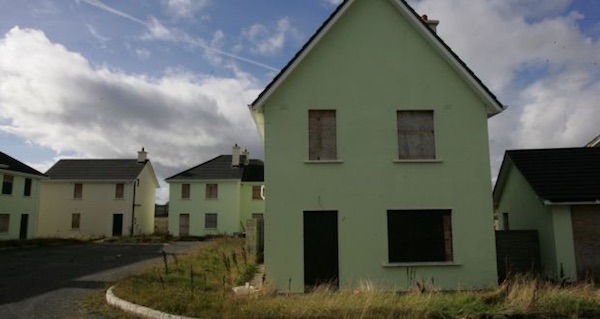
The scandal over the Dublin government’s failure to collect tax from US multinationals has refocused attention on its favourable treatment of international ‘vulture funds’ who purchased large property asset portfolios following the 2008 economic crisis.
The Fine Gael government stands accused of facilitating wholesale tax avoidance after it emerged that one vulture capital firm which took control of 1,400 properties, is liable to be taxed on its income at a rate of just 0.02%.
Social Democrats TD Stephen Donnelly has said that the government sold the loan-book for distressed mortgages for just 80 million euro, when the hedge fund that bought it now values it at more than five times that amount.
Donnelly called the accounts of the vulture firm that bought them, Mars Capital, a “masterclass in tax avoidance”, with around 1,000 euro in taxable profit from income of over 4.55 million euro.
He cited the example of a Kilkenny couple, Sarah and Dominic, who bought a home for their two kids and themselves in 2007, but were ordered to be evicted last month because the government had sold their mortgage. He said the couple would had been able to buy the property if they had received the same discount afforded the US investment firm.
He accused Mars Capital, operated by US firm Oaktree, of “blatant tax avoidance” on the assets they now control. “Tens of thousands of mortgages have been sold to various funds - so how much of untaxed money are leaving the country?”
Sinn Fein’s Pearse Doherty has also explained how Irish charities are being used by vulture funds to avoid paying tax. Mars Capital is owned by a registered charity, the Matheson Foundation, which may own up to 200 companies. In its first year of operation, Matheson is believed to have paid just 250 euro in total corporation tax to the Irish State, despite annual revenues of 14 million euro.
Companies such as Mars Capital are known as ‘section 110’ companies using a procedure introduced in 1997 to allow global companies to structure global assets in Ireland and avoid paying tax. Mr Doherty said the Revenue and the Department of Finance were well aware of the schemes.
“There can be no surprise from government about this issue; they, and Fianna Fail before them, have created a culture and laws which not only facilitate but encourage the avoidance of tax,” he said.
This week it emerged in a report for Dublin councillors that many of these properties, particularly land tracts, are being kept from the market in order to push up property prices and rents. There is now the concern that, with winter approaching, the numbers falling into homelessness is spinning out of control.
Homeless campaigner Fr Peter McVerry said the number of homeless people placed in emergency accommodation increased by almost 90 per cent last year, and the number of homeless children had doubled.
“What’s even more shocking than the figures is the fact that nobody is shocked,” he said.
“This has become the new norm and if the present rate continues we will be ‘celebrating’ 3,000 homeless children next year and nobody is going to raise an eyebrow.”
He did not believe that there was a problem with a lack of housing, but that there was a lack of willingness to seize empty houses.
“I believe there is no solution to homelessness without interfering with the right to private property . . . There are probably 130,000 households on those social housing waiting lists and there are 186,000 empty residential units in this country.
“Why we simply can’t take over those and use them for homelessness beats me.”
Compulsory purchase orders on many of those units would solve the supply problem, he said.
“The problem is governments don’t like compulsory purchase order on private property, but we do it if we want to build motorways, why can’t we do it if we want to house families?”
![[Irish Republican News]](https://republican-news.org/graphics/title_gifs/rn.gif)
![[Irish Republican News]](https://republican-news.org/graphics/title_gifs/harp.gif)

